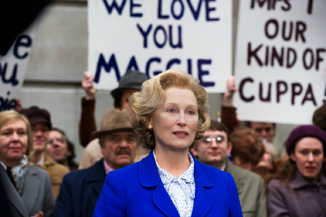|
|
Movie Review: The Iron LadyBy Matthew HuntleyJanuary 23, 2012
The film uses Thatcher’s fragile mental condition as a springboard to jump to different parts of her life and political career. The younger of two children, she was born into a Methodist family in Grantham, where her father was a grocer and mayor. She paid close attention to his speeches, which would eventually shape her own conservative ideals. A hard worker who was constantly determined to improve herself, Thatcher attended Oxford University and, at 25, became the youngest and only female candidate to run for a safe Labour seat in 1950 and 1951. Though she failed to win both times, she did meet her future husband in the process, but before agreeing to be his wife, she vowed she would never become some idle woman who didn’t speak her mind and whose only legacy would be a clean set of dishes. Bottom line: she wasn’t going to let her sex limit her voice or her ambition. That notion became clearer when she decided to run for Conservative Party Leader in 1975 and eventually Prime Minister four years later. She was aided by Gordon Reece (Roger Allam), a journalist and television producer, who counseled her as a political strategist, and we get the usual montage where Thatcher is groomed and conditioned, via speech lessons and a variety of new hairdos, to “put the ‘great’ back in Great Britain.” In the wake of widespread trade union strikes and the Labour Party’s ill-conceived attempt to control inflation, Thatcher promised a new beginning and won the vote. Her term would last for 11 years and become the longest of any 20th century prime minister in the UK.
|

|
|
|

|
Thursday, October 31, 2024
© 2024 Box Office Prophets, a division of One Of Us, Inc.


